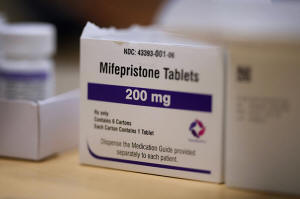Judge to hear arguments to Louisiana law listing abortion pills as
controlled dangerous substances
[May 15, 2025]
By SARA CLINE
BATON ROUGE, La. (AP) — Arguments surrounding first-of-its-kind
legislation that categorizes two widely used abortion -inducing drugs as
“controlled dangerous substances” in Louisiana are scheduled to take
place before a state judge Thursday morning.
In a lawsuit against the state, plaintiffs say the reclassification of
misoprostol and mifepristone — which have critical reproductive health
care uses in addition to being used as a two-drug regimen to end
pregnancies — could cause needless and potentially life-threatening
delays in treatment during medical emergencies.
The legal challenge, which was filed in October, says the law may slow
access to “lifesaving treatment for people experiencing obstetrical
emergencies” and make it “significantly harder” for people to “obtain
proven, effective remedies necessary for their treatment and care.”
Plaintiffs are asking the judge for a permanent injunction, ultimately
to halt the law that is currently in effect.
Defendants are asking the judge to dismiss the lawsuit. Louisiana
Attorney General Liz Murrill, one of the defendants listed in the suit,
told The Associated Press that she looks forward to “defending this law
vigorously” in court.
Louisiana, which has one of the strictest abortion bans in the country,
became the first state last year to heighten the classification of the
two pills. Passage of the measure by the GOP-dominated Legislature
marked a new approach in conservative efforts to restrict access to
abortion pills. In 2023, nearly two-thirds of all abortions in the
country were medication abortions.

The legislation spawned from anti-abortion groups and a Republican state
senator's effort to prevent coerced abortion and make it more difficult
for bad actors to obtain the drugs. The lawmaker pointed to the case of
his sister in Texas who in 2022 was slipped seven misoprostol pills by
her husband without her knowledge; the baby survived. Over the past 15
years, news outlets have reported on similar cases — none in Louisiana —
but the issue does not appear widespread.
“The Louisiana Legislature spoke loud and clear last year that they
stand for life and are against this controlled substance being
prescribed without a prescription from a doctor,” Murrill said.

[to top of second column]
|

Mifepristone tablets are seen in a Planned Parenthood clinic, July
18, 2024, in Ames, Iowa. (AP Photo/Charlie Neibergall, File)
 Prior to the reclassification, a
prescription was still needed to obtain mifepristone and misoprostol
in Louisiana. Before the change, medical personnel told The
Associated Press that in hospitals the drugs — which are also used
to treat miscarriages, induce labor and stop bleeding — were often
stored in an OB-GYN unit in a “hemorrhage box” in the room, on the
delivery table or in a nurse’s pocket, to ensure almost-immediate
access in common emergency situations.
The new law reclassified the pills as “Schedule IV drugs,” putting
them in the same category as the opioid tramadol and other
substances that can be addictive. Under the new classification,
there are extra steps and more stringent storage requirements. While
testifying against the legislation, doctors stressed the drugs would
be moved down the hall, in locked containers or elsewhere that may
result in slower access during emergency situations where every
second is vital.
With the heightened classification also comes increased charges. If
someone knowingly possesses mifepristone or misoprostol without a
valid prescription for any purpose, they could be fined up to $5,000
and sent to jail for one to five years. The law carves out
protections for pregnant women who obtain the drug without a
prescription to take on their own.
Among the plaintiffs listed in the lawsuit are; a physician; a
pharmacist; the Birthmark Doula Collective, an organization of
people trained to provide pregnancy care before, during and after
birth; Nancy Davis, a woman who was denied an abortion in Louisiana
and traveled out of state for one after learning her fetus would not
survive; and a woman who said she was turned away from two emergency
rooms instead of being treated for a miscarriage.
The legal challenge seeking a permanent injunction to halt the law
is being heard before a 19th Judicial District Court judge in Baton
Rouge. Thursday's hearing is expected to focus on the state's
request to dismiss the lawsuit.
All contents © copyright 2025 Associated Press. All rights reserved |